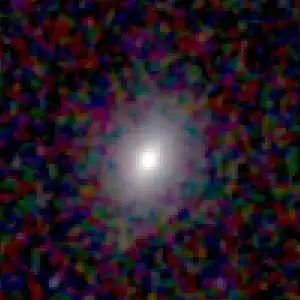| NGC 430 | |
|---|---|
 NGC 430 as seen by 2MASS | |
| Observation data (J2000 epoch) | |
| Constellation | Cetus |
| Right ascension | 01h 12m 59.9s[1] |
| Declination | −00° 15′ 09″[1] |
| Redshift | 0.017676[1] |
| Heliocentric radial velocity | 5,299 km/s[1] |
| Distance | 355.71 ± 213.16 Mly (109.060 ± 65.354 Mpc)[1] |
| Apparent magnitude (V) | 13.9b[1] |
| Absolute magnitude (V) | -23.03[1] |
| Characteristics | |
| Type | E:[1] |
| Apparent size (V) | 1.3' × 1.1'[1] |
| Other designations | |
| UGC 00765, CGCG 385-029, MCG +00-04-039, 2MASX J01125992-0015087, 2MASXi J0112599-001509, 6dF J0112599-001509, 6dFGSv 00674, PGC 4376.[1] | |
NGC 430 is an elliptical galaxy of type E: located in the constellation Cetus. It was discovered on October 1, 1785 by William Herschel. It was described by Dreyer as "faint, very small, round, very suddenly brighter middle similar to star."[2]

NGC 430 (SDSS)
References
External links
 Media related to NGC 430 at Wikimedia Commons
Media related to NGC 430 at Wikimedia Commons
This article is issued from Wikipedia. The text is licensed under Creative Commons - Attribution - Sharealike. Additional terms may apply for the media files.